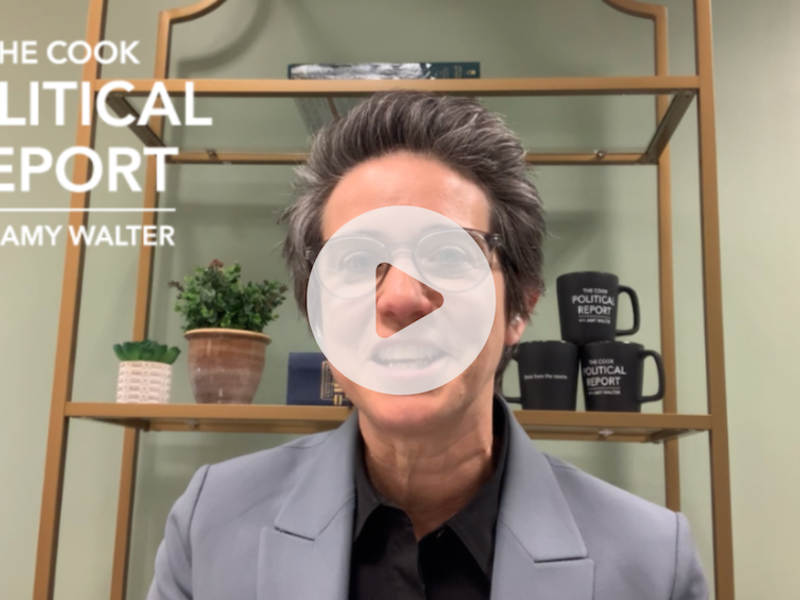
Many of us are wondering if this last year — one of the most tumultuous and consequential in American history — and the last four years of constant political turmoil were 'outliers' or if they represent the new normal.
A challenge for those of us who have covered politics for a long time (I've been doing this in some form or fashion since 1991), is that our sense of normal is often reflective of an era that no longer exists. The politics of the post-World War II era—one marked by stability—has been slowly, then seemingly all at once, completely upended.
Democrats controlled the House for 40 straight years from 1954 until 1994. Democratic control of the Senate lasted uninterrupted for 25 years—from 1955 to 1980. From 1952 until 1988, Republicans won 7 of 10 presidential elections. This is the era in which many of my peers (and those who mentored me) were raised.
Since 1994, however, the House has flipped control three times (2006, 2010, 2018). Control of the Senate has changed political hands five times since 1994. In other words, when I came to Washington in 1991, most Republicans who worked in politics had never been in the House majority, and few Democrats had much experience working in a White House.
Today, most of those who work in politics don't know of a time when control of the House, Senate and/or White House wasn't up for grabs. That includes the people who are in Congress. In the Senate, there are only six members who were elected in the pre-1994 era — GOP Sens. Chuck Grassley, Richard Shelby (who was a Democrat from 1986 until 1994), and Mitch McConnell and Democratic Sens. Patrick Leahy, Dianne Feinstein, and Patty Murray. In the House, just 27 members (22 of them Democrats) were elected in the pre-1994 era of the permanent Democratic majority. Only 87 members (or 20 percent of the House) were elected during the relatively tranquil time between 1994-2006 when Republicans kept hold of Congress for five-straight elections. That means that 80 percent of the House has been elected since 2006 when control of the House has changed hands three times.
In other words, most of the House and Senate (and those who work for them) have known nothing other than constant churn and change.
President Biden, of course, was born and raised in the era of congressional stability. It was a time where politicians could play the long game, building relationships and goodwill that would convey year after year, one congressional session after the other. Today, however, politics is a smash and grab; get what you can for the short time you are there. In theory, more volatility should produce more strategic thinking. After all, if you know that your time in the majority is limited, you want to make sure that you don't permanently undercut the power of the minority. This has been the thinking behind keeping the filibuster. But, that also requires a degree of faith in the other party that is not there today. For many Democrats, the events of January 6th only served to deepen their distrust of their GOP colleagues. After all, if a majority of Republicans were willing to throw out the Electoral College results, the Democratic thinking goes, why would we expect them to play be the rules once they get into the majority?
If there was an outlier election over the last 20-25 years, it was the 2008-09 era. Barack Obama's 365 Electoral College votes were the most captured by any winning candidate since 1996. That year was also the only time this century when a newly elected president had any Congressional coattails. In 2008, Democrats picked up 21 House seats. And, as the always astute Michael Podhorzer of the AFL-CIO pointed out recently, in every other presidential election won by a non-incumbent candidate - 2000, 2016, and 2020 - the winning candidate's party lost seats in the House. In fact, 2008 was the first, and only time, since 1980 that the winning non-incumbent presidential candidate's party didn't lose seats in the House.
In every election since 2012 we've had to unlearn many of the lessons from that era. Like how much faith we put into the idea that a growing Latino population would automatically translate into Democratic gains. Or, how the margins Democratic candidates would get in the future from white, blue-collar voters couldn't get any smaller than those received by an African-American man with the name Barack Obama.
As we forge ahead into President Biden's first term, it's safe to say that it won't be as dramatic or chaotic as the Trump era. But, that doesn't mean it will be stable. In fact, political volatility has been a feature, not a bug, of 21st-century politics.








Subscribe Today
Our subscribers have first access to individual race pages for each House, Senate and Governors race, which will include race ratings (each race is rated on a seven-point scale) and a narrative analysis pertaining to that race.